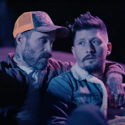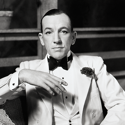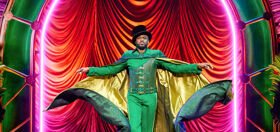
It’s not as testosterone-driven as, say, nü metal or gangsta rap, but surf rock is a genre that’s been dominated by men from its origins in the early 1960s with the Beach Boys and the Del-Tones, to its revival in the 1990s with Man or Astro-man?, Los Straitjackets and the Pixies, and even up to today. But Susan SurfTone former front woman of Susan and the Surftones, has carved out some space for women among the beach blankets, bongos and boogie boards.
Born Susan Yasinski, SurfTone has been breaking boundaries for most of her life: In the mid-1960s, while other girls might’ve dreamed of marrying John or Ringo, she was a young guitar prodigy with dreams of playing professionally. “[My parents] told me I could do anything I put my mind to,” she recalls. “They bought me a guitar and I started taking lessons when I was 9 years old. I was good right off the bat, and my teacher started giving me real songs to practice on.” It wasn’t long, she says, that she realized she wanted to be in a band. “And I didn’t want to be a ‘girl singer,’ I wanted to be a guitarist.”
Aware that “aspiring rock star” might not be the mos t profitable career path, she attended Boston University law school and joined the FBI at the height of the Cold War. “I enjoyed that job a lot, but I had the chance to play CBGB and I asked my supervisor, who said I absolutely couldn’t do that. And the death of John Lennon had made me realize that music was really the most important thing for me.”
t profitable career path, she attended Boston University law school and joined the FBI at the height of the Cold War. “I enjoyed that job a lot, but I had the chance to play CBGB and I asked my supervisor, who said I absolutely couldn’t do that. And the death of John Lennon had made me realize that music was really the most important thing for me.”
After forays in New Wave and other genres (that’s her at left with her band Black Tights), she formed Susan and the Surftones in 1993, while she was still working as an FBI agent (you read that right). The band toured internationally, saw its music appear on The Real World and get airplay around the world. By this point Surftone had accepted she was a lesbian and had girlfriends, but never made her sexuality a part of her public identity. “I consider myself a musician who happens to be gay, more than as ‘a gay musician,” she says. “Although I have to admit that one of the motivating factors in getting into a band was to get girls—which I know a lot of other musicians can relate to!”
Last year, after the demise of the band, SurfTone began working as a solo artist and released her first solo album, Shore, in October 2011. In March, she joined other girl rockers, like Morningwood’s  Chantal Claret and Sugarland bassist Annie Clements, as a spokeswoman for Daisy Rock Girl Guitars. In between tour dates and promo events, SurfTone talked with Queerty about the album, her career and coming out in rock music.
Chantal Claret and Sugarland bassist Annie Clements, as a spokeswoman for Daisy Rock Girl Guitars. In between tour dates and promo events, SurfTone talked with Queerty about the album, her career and coming out in rock music.
How does a nice girl from Upstate New York get into early ’60s surf rock?
My guitar teacher introduced me to The Ventures in 1965 and WTRY, an AM radio station in Troy, NY, played the instrumental surf hits of the day, like as “Pipeline” and “Wipe-Out.” I knew at an early age that I was no vocalist so the instrumental songs with strong clear melody lines caught my ear and many of those were surf rock.
Who are your biggest influences musically?
The biggest influence is The Beatles. I loved George Harrison’s lead guitar and John Lennon’s rhythm guitar. Later I came to greatly appreciate Paul McCartney’s bass playing. And I always thought Ringo was very underrated as a drummer. The Ventures are certainly big influence.
Is there an artist you’d love to collaborate with?
I’d love to work with Deborah Harry and Clem Burke. I am a big Blondie fan—one of my life’s regrets is that I passed up a chance to see Blondie at the Paradise in Boston right before “Heart of Glass” broke. I’d also like to work with Pauline Black from The Selecter. Two Tone was always a big deal with me. I’ve been listening to a lot of it lately and I have a feeling a bit of ska might find its way into my next record.
There’s the whole stereotype that “girls can’t play guitars.” Have you faced prejudice in the surf-rock scene for being a woman—and a lesbian, no less?
There has been some, but not as much as you might expect. For a long time the comment, “a girl playing surf guitar, this I’ve got see!” followed me around. I don’t hear that much anymore.I guess if you do it long enough and you do it well, the detractors give up. Although I never concealed it, I really went public with the fact that I am a lesbian with the 2011 release of Shore. My mother had a real problem with the fact that I am gay—it was a big source of friction between us. She died in 2009 and I felt able to finally make it public. I think most of the surf-rock community already knew and it shouldn’t have shocked any of those who hadn’t figured it out by now.
You were pretty high-level FBI at a time when b eing openly gay in the Bureau was a non-starter. How did having to hide your identity affect your personal life?
eing openly gay in the Bureau was a non-starter. How did having to hide your identity affect your personal life?
I lived with a woman while I was in the Bureau and again, while I didn’t flaunt it, I am sure there were those co-workers of mine who knew. The environment was really “Don’t Ask, Don’t Tell” and I certainly wasn’t the only gay special agent. I was nervous about going to the gay clubs and, finally, one night my girlfriend insisted we go to a lesbian club. We walked up to the bar and seated at the bar was another female agent. We had a good laugh and became friends.
Although it wasn’t like the Hoover days, I knew my homosexuality would probably inhibit my chances of advancement in the Bureau. At 28, I didn’t want to be in a dead-end job. Besides I wanted to play guitar in a band and the Bureau viewed playing in the clubs in New York as a conflict. So I made my choice.
What made you want to break from Susan and the Surftones and go solo?
In 2005, the band I had put together on the West Coast broke up as far as live gigs went. I worked with a few members on CD projects. I started playing bass on these recordings. I really enjoyed it so I got a Hofner Beatle bass, got The Beatles records out, and learned how to get better at it from Paul McCartney. Then I started to experiment with the keyboards. I recorded solo demos at home that became the basis for Shore. Producer Steve Kravac listened to those demos and gave me some suggestions for re-writes. As it turned out Steve is a great drummer—Shore is me and Steve.
Is there a song on Shore that you see as a real breakout single?
My favorites tracks are “Shore” and “Jade”—I like them all but those are the two I seem to go back to the most. Both are in the live set. “Shore” is a surf/garage rocker song but it’s a bit like jazz, because I never play it the exact same way twice.
I really relate to the mood of “Jade.” It’s upbeat with a minor chord thrown in that gives it a twist. I think people who know me would describe me that way: upbeat with a few minor chords thrown in.
Shore is out now on Acme Brothers Records. Photos via Robbie McClaran


















milpert
It’s not nice to say that someone “strikes out” in their career choice.
Dan Avery
@milpert: The headline is referring to SurfTone “striking out on her own” as a solo star, not that she’s unsuccessful or has “struck out” in the baseball sense. I’m a big fan—and love the new album.